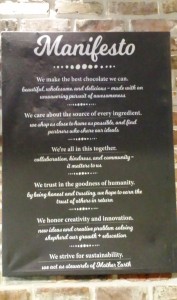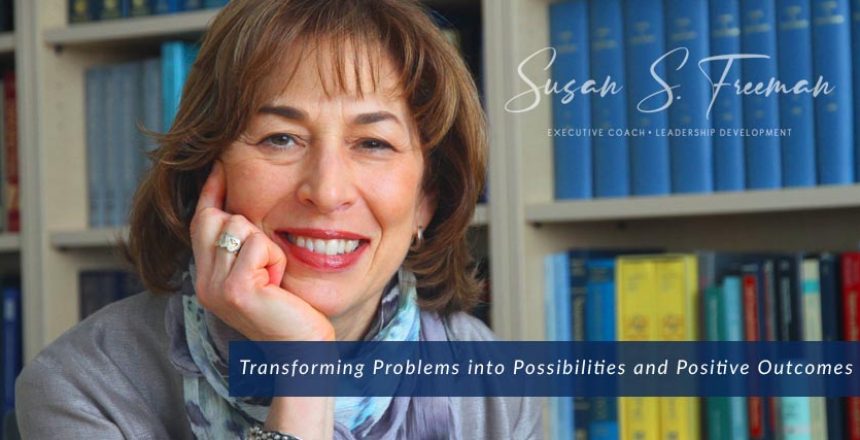Recently I was in a very special food establishment in Asheville, North Carolina, The French Broad Chocolate Company. As I sat down to enjoy a hot liquid truffle concoction, my eyes caught the word “Manifesto” boldly appearing right above the table. Being curious and already delighted (this being a chocolate lover’s paradise), I stopped to read the company’s description of its purpose. As you can see from the attached photo, this is no ordinary mission statement. Here are my observations:
-
 Every line begins with “we;” this represents the community and team of people with a shared purpose.
Every line begins with “we;” this represents the community and team of people with a shared purpose. -
Each part of the statement gives support underneath that enhances the credibility of the claim; specific features are described.
-
Words such as “care,” “trust” and “honor” show humility and desire to be connected to each other and to their customers.
-
Values are explicitly stated; we know they care about creativity, innovation, local sourcing of product ingredients, environmental sustainability.
-
Overall promise is credible; “we make the best chocolate we can” notice how it’s not “we make the best chocolate in the world.” The latter would communicate a competitive perspective; we are better than other companies who sell chocolate. By stating “the best we can,” it’s about them; not their competitors. They come across as believable because every single line is backed up
This caught my eye because I do quite a bit of work with leaders and their teams who are in the throes of evolution; from one stage of growth to the next. Often, leaders have been so focused on building a strong top and bottom line they have neglected the important foundational work around values and vision.
Recently, I have been reading about the trend for companies to communicate the value of their purpose. The Wall Street Journal reported the following:
“I Don’t Have a Job. I Have a Higher Calling.”
The article goes on to point out this is because in part “professionals are demanding more meaning from their careers because work simply takes up more of life than before, thanks to longer hours, competitive pressures and technological tethers of the modern job. Meanwhile, traditional sources of meaning and purpose, such as religion, have receded in many corners of the country.
“The words “mission”, “higher purpose,” “change the world,” or “changing the world” were mentioned on earnings calls, in investor meetings and industry conferences 3243 times in 2014, up from 2318 five years ago, according to a Factiva search.”
I noticed this because as an executive coach, I see the impact of having a strong, articulated purpose for leaders and their teams. When it exists, teams have a strong, unified theme to anchor them through the tough times.
Companies that have done the work have a strong edge; can be used to increase loyalty, engagement as well as in recruiting.
If your leadership could benefit from a “higher purpose” conversation, here are 5 questions to get you started:
- What are your personal values?
- What are your company/organizational values?
- Are they in alignment?
- Are they being lived each day?
- If not, what gets in the way?
I invite you to post your comments here. If you are curious about how to inspire and lead a team to a “higher purpose,” I look forward to hearing from you.

